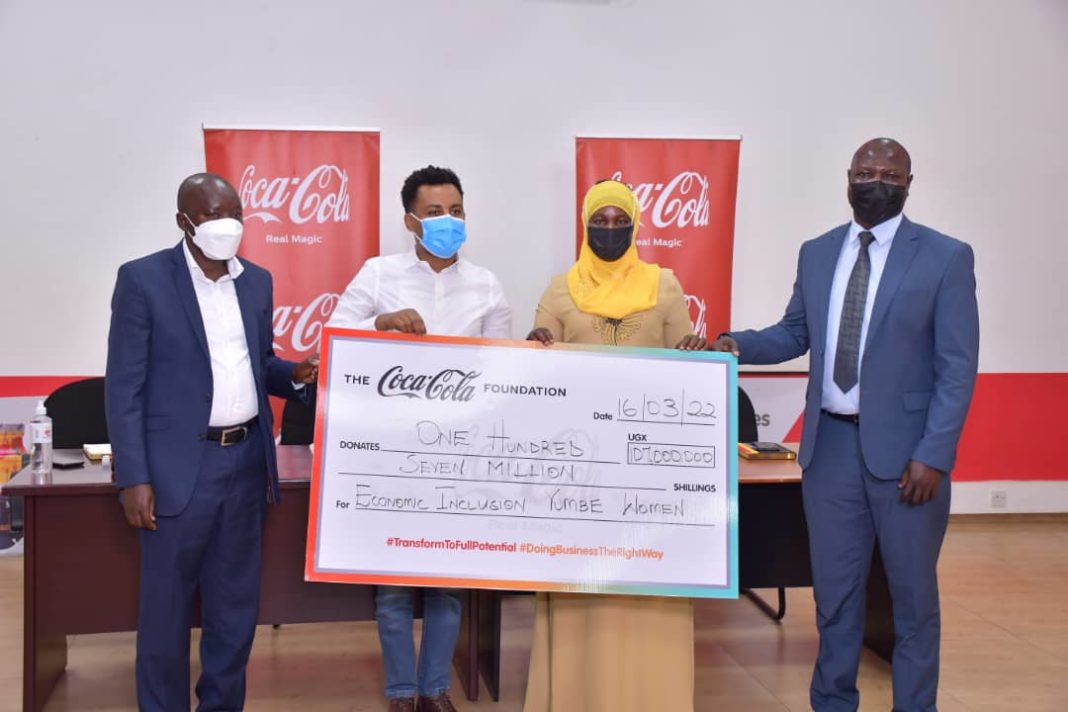The Coca-Cola Foundation through Coca-Cola Beverages Africa (CCBA) in Uganda has donated Shs 107m to TCP Global.
The donation is aimed at expanding micro-loan programs in Yumbe District, Northern Uganda in order to enable refugee women access loans from their Saccos, through an existing partnership with the Care Community Education Centre (CCEDUC). The donation will enable the organization to add ten women’s Village Savings and Loan Associations (VSLA) groups to the twenty-seven it is currently assisting. The VSLA groups have a minimum of 15-30 women indicating that over 500 women are bound to benefit from the program.
Speaking at the handover engagement, Naima MelsaGuleAvako, theYumbe Member of Parliament representative applauded Coca-Cola for the support. She noted that women often face financial exclusion due to lack of necessary support to acquire loans and lack of collateral.
“We know that a lack of access to finance is one of the major barriers women face especially in marginalized communities across the world. The key to building resilience is financial stability. Women financial empowerment has a ripple effect which extends to the family, community, and the entire nation. Without access to finance, women face difficulties in collecting and saving income to grow their businesses and pulling their families out of poverty,” she said.
“This grant will enable the economic uplifting of many women as we eliminate the hurdles in accessing finance that the majority of women face. Community-based savings groups provide access to even the most basic financial services, which are extremely limited in rural areas. These groups provide a secure place to save, the opportunity to borrow in small amounts and on flexible terms, and a network of support and solidarity. We are grateful to The Coca-Cola Foundation for this support,” she added.
According to The Consultative Group to Assist the Poor (CGAP), nearly one of every three women in the world 1.1 billion women is excluded from the formal financial system yet financial inclusion has been identified as an enabler for 7 of the 17 Sustainable Development Goals.
In his remarks Melkamu Abebe, General Manager, Coca-Cola Beverages Africa (CCBA) in Uganda, reiterated the company’s commitment to youth and women economic inclusion as part of its contribution to building a better Africa.
“As the Coca-Cola system, we believe in doing business the right way wherever we operate. Doing business the right way means we must be responsive within the communities in which we operate, and we must always stick to our vision of making Africa a better place for all. Women, in particular, form more than 50% of Uganda’s young population; yet in spite of this demographic, women are usually under-represented in the main fields of economic progress and wealth creation.At Coca-Cola we have made clear commitments to change that and have delivered on these commitments. Most significantly, we delivered on our global 5by20 Women Empowerment initiative, under which we aimed to empower five (5) million women globally by 2020. I am proud to say that two (2) million of the empowered women were in Africa, all empowered to work and succeed as entrepreneurs earning sustainable incomes,” he said.
The covid-19 pandemic exacerbated the challenges faced by women led businesses as majority are involved in activities that were most hit. There is overwhelming evidence that achieving equality and empowerment for women has broad ripple effects that are good for society. As pillars of their communities, women invest a sizable portion of the income they earn on the health and education of their children and in their local economies, creating a tremendous economic impact
“Economic inclusion is the opening of gainful economic opportunities by providing access to markets and other economic activities leveraging the business and the entire industry. When addressing Economic Inclusion our aim as the Coca-Cola system is to boost income, provide decent earning potential and improve skills and business knowledge for women, resulting in them accessing other opportunities. This focus is even more important as we emerge from the COVID-19 pandemic and its impact on economies around the world including ours,” Abebe concluded.








